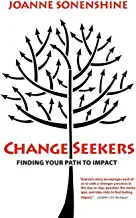ChangeSeekers by Joanne Sonenshine
It’s not always clear where we’re headed in life, or in our career. We’re in an age where it seems like we have to decide what our one, true calling is and what we will do with the rest of our lives at a relatively young age. However, this isn’t always the way it turns out and, more often than not, we get hit by the realization that where we are in life is not where we want to be, and most times in our careers, we certainly are not doing what we want to be doing.
Joanne Sonenshine is the Founder and CEO of Connective Impact, a business that brings organizations and corporations together to make lasting, sustainable progress with the utilization of resources, to make the planet safer. But before getting to where she is now, she started out in finance, moved to government work, and then lobbying, to name a few. With the benefit of hindsight, she now shares in our Q&A the wisdom, advice, and more that she’s gained in her book ChangeSeekers: Finding Your Path to Impact.
BookTrib: You went from private banking into a non-profit, before starting your own business – can you tell us a little about what inspired this change?
Joanne Sonenshine: Studying economics as an undergrad I had investment banking stenciled into my psyche as the definition of success. So when I landed a once-in-a-lifetime job working with the bond sales team of an international bank in London, one would think I had reached the pinnacle of my career. I was 25, though, and naïve. I had no sense of what made the world go round, and as I started understanding more about the complexities of our planet, seeing instances of poverty throughout my travels, and realizing that my background in economics could be better served by those underserved by governments and services, rather than rich company leaders, it got me thinking that banking may not be my true career path.
When 9/11 happened, I was shaken to the core by the thought of our country being attacked. I felt alone living so far away, scared and angry. I decided then to quit my banking job and find a way to shape my economics background into something more meaningful and contributing to improving our world. After obtaining a graduate degree, working for the U.S. Government, becoming a lobbyist and then surmising that a nonprofit may help me find a sense of fulfillment I had not yet found, I realized that none of these positions were allowing me to change the world. I grew impatient and frustrated that I couldn’t make more of a difference. Starting my own business to push companies, nonprofits and governments to partner more effectively seemed ultimately like my only hope to affect the kind of change I so sought.
BookTrib: What was the hardest thing you had to learn when you first started your business?
JS: Pricing has and continues to be the hardest part of running my business. I started Connective Impact in order to make a difference in this world, so I often work with organizations that are not for profit, or social enterprises. Budgets aren’t large. Thus it’s difficult to charge what our services are actually worth. We do our best, but it’s an ongoing struggle to find the balance between our service delivery cost and where budgets are able to afford us.
BookTrib: Is there one key work element that you would like to see instituted across the workplace?
JS: I’d love to see people paid what they are worth. It’s still amazing to think that we play professional sports players hundreds of millions of dollars, and the people we entrust to shape the lives of our children barely scrape by. Caregivers, farmers, construction workers, food operators, retailer workers all make so little. Yet we depend on their services more than so many others. Why do we continue to let this go on?
BookTrib: You now run a certified women’s owned business – what do you think is the greatest challenge facing women in the workplace right now?
JS: Having it all and doing it all. I write a chapter in the book about this urgent need we all have as professional woman to ‘have it all.’ We want to be successful, and make as much money as men, have the same titles, run the same entities. Yet we also want to be the best mothers, wives, daughters, friends while also serving our communities, cooking home cooked meals, keeping a clean and beautiful home and entertaining like Martha Stewart. It just isn’t possible. Yet we put so much pressure on ourselves to make this a reality. It’s not. No way.
If there’s any way workplaces can recognize this burden that women put on themselves that any way you shake it is just not taken on by men, I believe we’d be far more productive. Let women work according to their own schedules. Let them work remotely. Give them opportunities to be there for their family. Assume they will still get their work done, and get it done well. The space for that is currently limited to those of us that work for ourselves. We need that flexibility to be ubiquitous.
BookTrib: Do you have any advice you would give to others who want to make a change in their work?
JS: At the end of each chapter in my book I give a recommendation. You can download all of them from my website, but generally I suggest to go with your instinct, take some risks and don’t question your motives. It’s pretty amazing how far our own sense of rationale can take us down several paths that may seem for lack of reason, yet at the end show us why we are on the journey in the first place.
ChangeSeekers: Finding Your Path to Impact is available for purchase now.
Buy this Book!
Amazon




